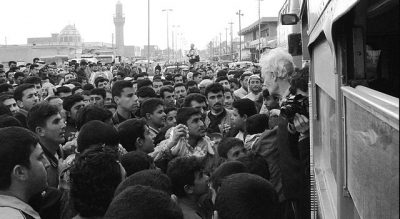
February 2, 2018, by Michael Timmins
Liberal Arts is global

Anti-war activists from western countries cross the border into Iraq to act as human shields in 2003.
We are accustomed to hearing about global issues. Conflict, health, pollution and economics are frequently asserted as ‘global concerns’. Indeed, with the advent of ‘globalisation’ in late twentieth century capitalism and the idea that we live in a ‘global village’ with the development of the internet, individuals, communities and issues are now framed within this context.
However, the reality of this move to a global status is far more complex than to be used just as a buzzword. To think and act globally is a product of historical process, economic shifts, social movements, political theories and cultural values. There are positive elements to this change; communities are now created across national boundaries, common appeals to universal rights and responsibilities have made an impact and charitable efforts in response to disasters and emergencies demonstrate an empathetic understanding in our world.
However, these perspectives are also born out of war, colonisation, repression, exploitation and violence. The global world in which we live is bought at a high price. Indeed, modern slavery, poverty and people trafficking are a consequence of this globalisation. To think globally and to be a ‘global citizen’ is to engage with all the potentials and the problems the modern world has to offer.
Within the Liberal Arts degree we assess key points in the emergence of this idea of globalisation and we ask that though being a global citizen might be beset with issues, how can we effect change in the world by thinking globally.
We can begin by thinking about the tools and the frames that we use to think globally. From foods, clothes, music, values, ideals, rights and responsibilities, our notions of globalisation are formed through and with the tangible and the intangible. We create the global world by our tastes and habits as by our actions and values.

Students on our Ningbo campus, China.
At the University of Nottingham we can explore these issues further with our campuses in Malaysia and China as globalisation looks very different when you take the perspective from other parts of the world. This is essential as too often the concepts of global thinking can merely be affirmations of a white, male, middle class, western perspective.
Through our study of global awareness, we can see globalism as a force for change in the world, sometimes for ill and sometimes for good. To enable us to use globalism as a means of altering our world for the better, we need to think critically about globalism but also to reflect on what it means for us think globally.
Ross Wilson
Director of Liberal Arts, University of Nottingham
nottingham.ac.uk/go/liberalarts

“The global world in which we live is bought at a high price. Indeed, modern slavery, poverty and people trafficking are a consequence of this globalisation. To think globally and to be a ‘global citizen’ is to engage with all the potentials and the problems the modern world has to offer.”
I might have misunderstood this somehow, but the claim that poverty is a product of globalisation is bizzare – poverty is close to an all time low, and globalisation close to an all time high. Is this suggesting that globalisation is causing poverty?